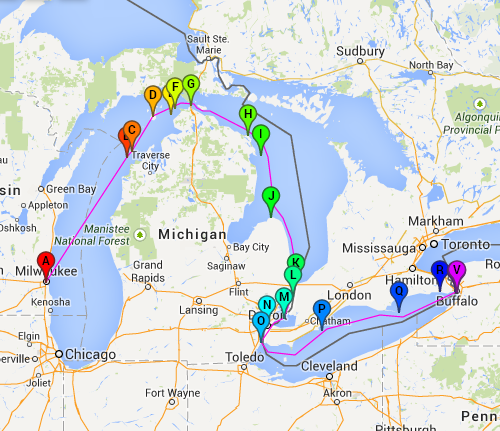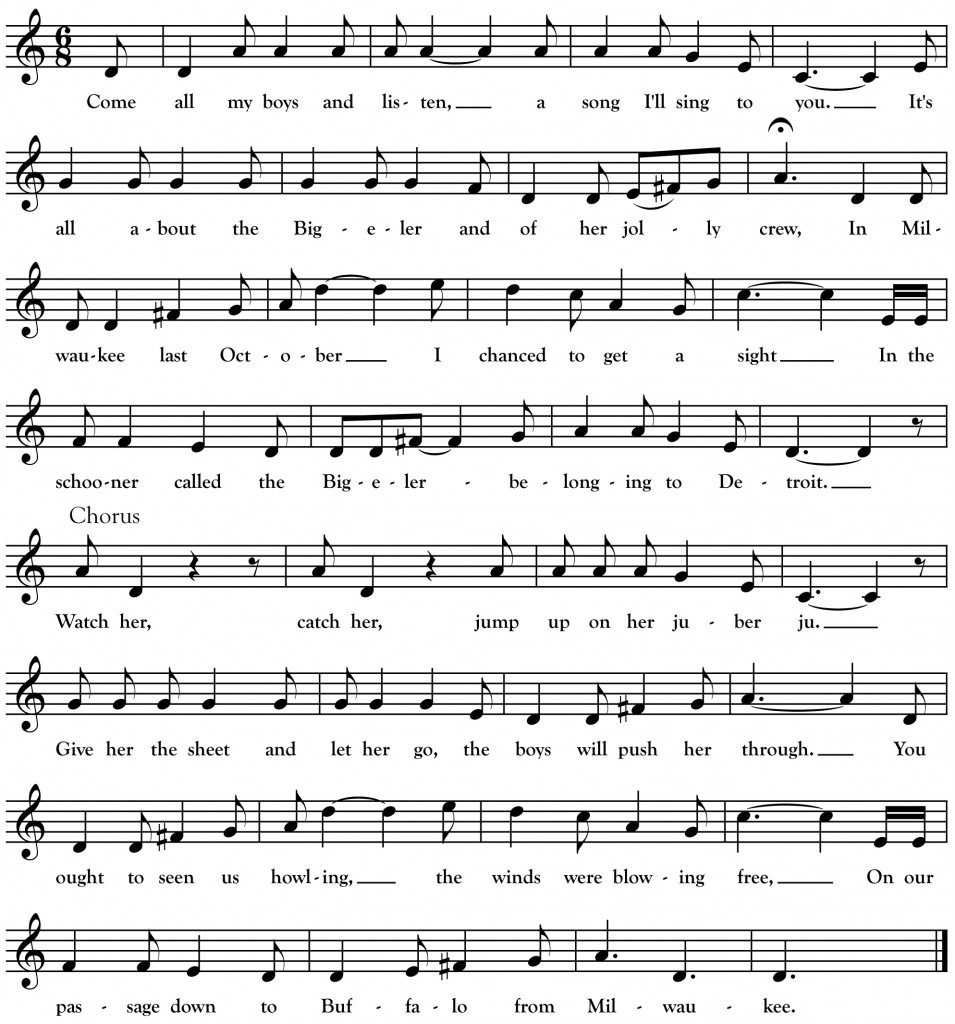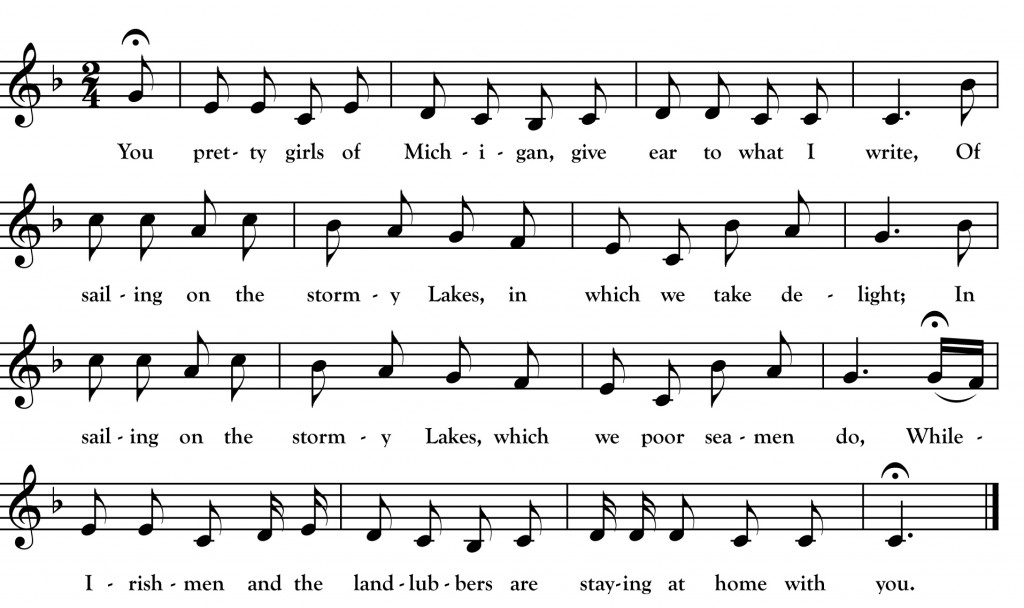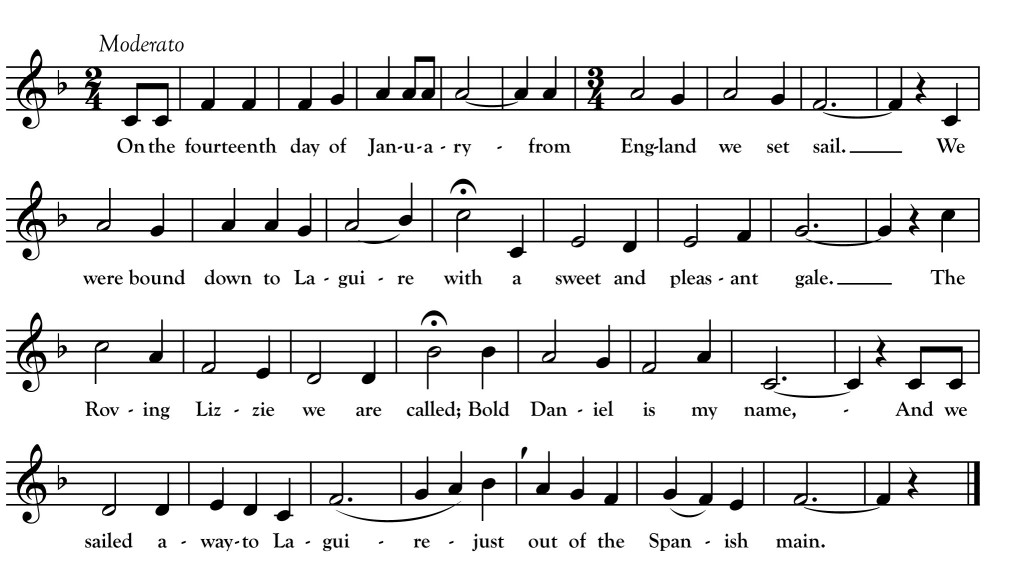The Bigler’s Crew (Laws D8)

The interactive map above includes all the landmarks mentioned in the folksong “The Bigler’s Crew” as collected from Minnesota singer Michael Cassius Dean (1858-1931) and sung, transcribed and discussed by me below. Click on a marked location in the map to see its name and the line in the song that references it—or play the video below and follow along! The map gives a great depiction of the ship’s course as it made its way from Milwaukee to Buffalo with a load of logs (the Bigler was what was known as a “timber drogher”).
Come all my boys and listen, a song I’ll sing to you,
It’s all about the Bigler and of her jolly crew;
In Milwaukee last October I chanced to get a sight
In the schooner called the Bigler belonging to Detroit.
Chorus—
Watch her, catch her, jump up on her juber ju,
Give her the sheet and let her slide, the boys will push her through.
You ought to see us howling, the winds were blowing free,
On our passage down to Buffalo from Milwaukee,
It was on a Sunday morning about the hour of ten,
The Robert Emmet towed us out into Lake Michigan;
We set sail where she left us in the middle of the fleet,
And the wind being from the southard, oh, we had to give her sheet. Cho
Then the wind chopped ’round to the sou souwest and blew both fresh and strong,
But softly through Lake Michigan the Bigler she rolled on,
And far beyond her foaming bow the dashing waves did fling,
With every stitch of canvas set, her course was wing and wing. Cho
But the wind it came ahead before we reached the Manitous,
Three dollars and a half a day just suited the Bigler’s crew;
From there unto the Beavers we steered her full and by,
And we kept her to the wind, my boys, as close as she could lie. Cho
Through Skillagelee and Wabble Shanks the entrance to the Straits,
We might have passed the big fleet there if they’d hove to and wait,
But we drove them on before us the nicest ever you saw,
Out into Lake Huron from the Straits of Mackinaw. Cho
We made Presque Isle Light and then we boomed away,
The wind it being fair, for the Isle of Thunder Bay,
But when the wind it shifted, we hauled her on her starboard tack,
With a good lookout ahead for the Light of the Point AuBarques. Cho
We made the Light and kept in sight of Michigan North Shore,
A-booming for the river as we’d oft times done before,
When right abreast Port Huron Light our small anchor we let go,
And the Sweepstakes came alongside and took the Bigler in tow. Cho
The Sweepstakes took eight in tow and all of us fore and aft,
She towed us down to Lake St. Clare and stuck us on the flats,
She parted the Hunter’s tow line in trying to give relief,
And stem and stern went the Bigler into the boat called Maple Leaf. Cho
The Sweepstakes then she towed us outside the River Light,
Lake Erie for to roam and the blustering winds to fight;
The wind being from the southard we paddled our own canoe,
With her nose pointed for the Dummy, she’s hell bent for Buffalo. Cho
We made the OH and passed long Point, the wind was blowing free,
We howled along the Canada shore, Port Colborne on our lea;
What is it that looms up ahead, so well known as we draw near,
For like a blazing star shone the light on Buffalo Pier. Cho
And now we are safely landed in Buffalo Creek at last,
And under Riggs’ elevator the Bigler she’s made fast,
And in some Lager beer saloon we’ll let the bottle pass,
For we are jolly shipmates and we’ll drink a social glass. Cho
_________________________________________________________
The Bigler’s Crew was one of (at least) 33 songs Robert W. Gordon recorded from Michael Dean’s singing. It was once one of the most widely known Great Lakes songs. The Bigler was a type of ship called a “timber drogher” that was quite slow and sported some rather useless sails (hence the reliance on tug boats). The song pokes fun at the ship while naming many on the landmarks one would pass between Milwaukee and Buffalo, NY. I transcribed Gordon’s recording of Dean and took the text from Dean’s songster The Flying Cloud.
Some of the landmarks required some research to decipher. Dean’s mention of “the OH” had me stumped until I found another version of the song collected by Joanna Colcord from singer (and amateur song collector) Joseph McGinnis. McGinnis’ version used the spelling “the Eau” which led me to an 1896 article in this magazine (found on Google Books) that used the nickname “The Eau” for Rondeau Harbour, Ontario.
There is more background on this song on the Traditional Ballad Index site here: http://www.fresnostate.edu/folklore/ballads/LD08.html




